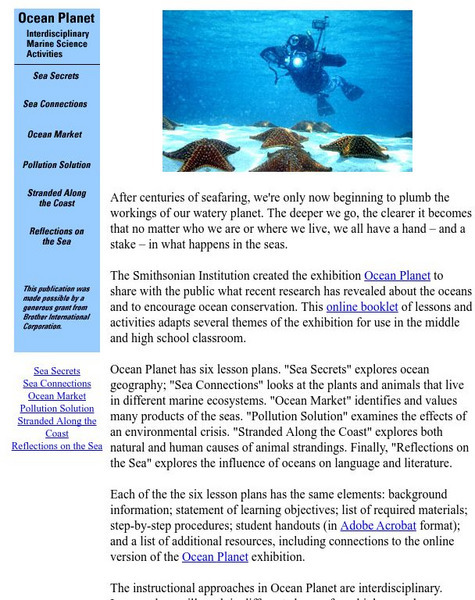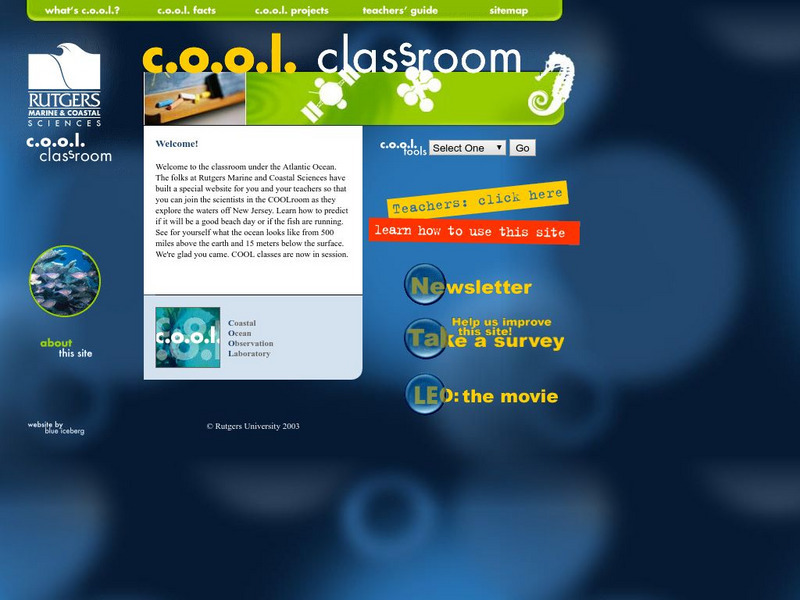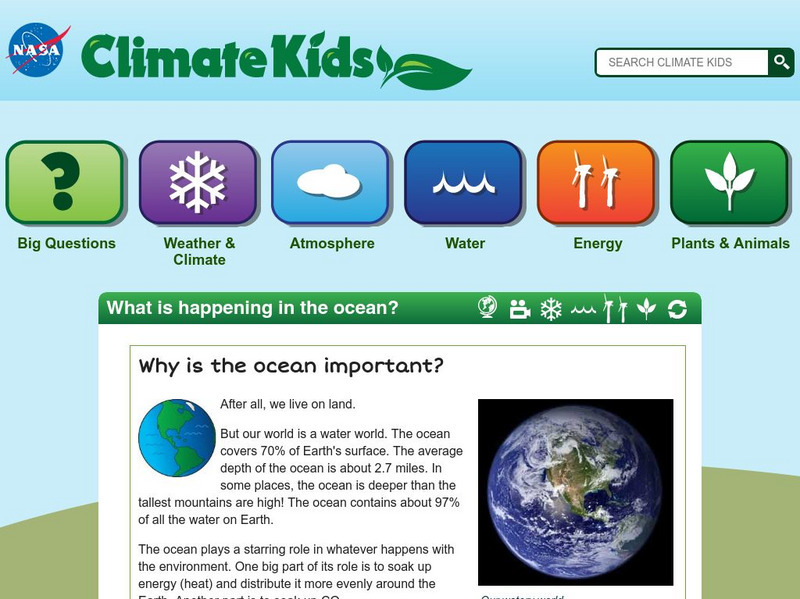Hi, what do you want to do?
Curated OER
Energy Flow in Ecosystems
Students, in groups, create a slide show about the ecosystem and answer critical thinking questions based on their research.
Curated OER
Supermarkets, Sustenance and Sustainability
Students investigate jungles and the people who depend upon them. In this sustainability instructional activity, students research wild life conservation and discover the importance of a jungle to Amazonian people. Students...
Curated OER
Camouflage, Protection, & Adaptations—Who am I?
Pupils explore ocean animal adaptations. In this animal adaptations lesson plan, students examine how different ocean animals use adaptations other than camouflage to protect themselves.
Curated OER
Water Pollution
Students explore the causes of water pollution. In this environmental lesson, students conduct experiments with natural filtration systems.
Curated OER
Head to Foot
Learners describe the body form and major anatomical structures of squids and describe some unusual or unique features of newly-discovered deep water squid species. They infer what types of food squids use from their anatomical features.
Curated OER
Gone Fishing
Learners examine the effects of various methods of fishing on fish populations and biodiversity. They read a handout, participate in a simulation of different fishing methods, record the results, and answer discussion questions.
Curated OER
Shark Attack
Students examine the white shark. They think critically about a set of shark facts and predict whether the statements are true or false. Students describe a year in the life of a white shark living in the Red Triangle. They create a...
Curated OER
A Dog Eat Dog World
Fourth graders distinguish between acquatic and terrestrial organisms. They label animals as producers, consumers, and/or decomposers.
Smithsonian Institution
National Museum of Natural History: Ocean Planet
Detailed website that was a companion to a 1995 traveling exhibit of the Smithsonian. Links to lesson plans and other educational materials are at the bottom of the page. Enter the exhibition to explore the world of the ocean.
PBS
Pbs: Secrets of the Ocean Realm
At this site students can read about sea creatures and ocean plant life, and see pictures of each.
Smithsonian Institution
Smithsonian Education: Ocean Planet
A series of lesson plans designed to be used with the Smithsonian Ocean Planet exhibit (available online). Lesson topics include marine ecosystems, pollution of ocean water, animal strandings, and literature.
Science Struck
Science Struck: Decomposers in the Ocean: Role and Examples
Describes five different types of decomposers that feed on decaying organic matter in the oceans and that are at the bottom of the ocean food chain.
Other
Rutgers Marine & Coastal Sciences: Cool Classroom
Students and teachers can explore the work of marine scientists and observe the ocean from their computers. Learn about Rutgers Coastal Ocean Observation Laboratory, discover why oceanography is important, and see what life is like in...
Science Struck
Science Struck: A Helpful Guide to Understand the Photic Zone
The photic zone is the upper layer of the ocean where sunlight can penetrate and support photosynthesis. This article explains the characteristics of this zone, the food chain that exists there, the adaptations of the plants and animals,...
Other
Digital Library for Earth System Education: Teaching Box: Seasonal Upwelling
A suite of lessons focusing on the process of upwelling. Inquiry-based exploration of seasonal upwelling includes marine food webs, food production in the ocean, wind-driven ocean currents, and seasonal changes in biotic and abiotic...
BiologyWise
Biology Wise: A Brief Guide to the Steps of the Carbon Cycle
Outlines the steps for the movement of carbon along the carbon cycle through photosynthesis, food chains, being dissolved into the ocean, the decomposition of organisms, fossil fuel formation, industrial use of fossil fuels, carbon...
Other
Bigelow Laboratory for Ocean Sciences: Fitting Algae Into the Food Web
A lesson that helps students understand food chains and food webs. With the background information, interactive activity, and extensions, students will see the interconnectedness and interdependence of organisms. Activity has students...
World Wildlife Fund for Nature
Wwf: Our Earth: Ecoregions: Habitats: Oceans
An introduction and overview of the ocean habitat, the largest habitat on Earth. Includes links to information about three animals that live in this habitat.
PBS
Pbs: Nature: The Fascinating World of Jellies
Learn about the mysterious jellyfish blooms that have occurred in the world's oceans. Because the resulting alteration to the marine food web has had devastating effects, researchers grow and study jellyfish at the Monterey aquarium....
Georgia Department of Education
Ga Virtual Learning: Marine Invertebrates
Students learn about invertebrates found in the ocean, their individual methods of adaptations, identifying characteristics, and contributions to the marine ecosystem.
Missouri Botanical Garden
Missouri Botanical Garden: Food From the Sea
Did you know that 80% of the fish we eat comes from the ocean? Since oceans cover so much of the earth you would think that we would never be in danger of running out of its resources. Learn how overfishing is causing many problems with...
TED Talks
Ted: Ted Ed: Why Are Sharks So Awesome?
Sharks have been celebrated as powerful gods by some native cultures. And today, sharks are recognized as apex predators of the world's ocean. What is it that makes these fish worthy of our ancient legends and so successful in the seas?...
NASA
Nasa: Big Questions: Oceans
Learn more about the oceans that cover so much of our planet. Five big Q and A's are addressed including why oceans are so important, how oceans soak up energy and gases, the relationship between climate and oceans, and the function of...
Texas A&M University
Texas A&m University: Fisheries Activities
Site from the Texas A&M University provides activities on fisheries that teachers can use in their classrooms to help students learn more about them. Some of the topics included are ecosystems, ocean food chains, fish prints and more.























